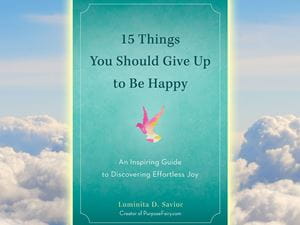
15 THINGS YOU SHOULD GIVE UP TO BE HAPPY: An Inspiring Guide to Discovering Effortless Joy by Luminita D. Saviuc, published by TarcherPerigee, an imprint of Penguin Publishing Group, a division of Penguin Random House LLC. Copyright © 2016 by Luminita Daniela Saviuc
1. Recognize That We Are All One
A human being is a part of the whole called by us universe, a part limited in time and space. He experiences himself, his thoughts and feelings as something separated from the rest, a kind of optical delusion of his consciousness. This delusion is a kind of prison for us, restricting us to our personal desires and to affection for a few persons nearest to us. Our task must be to free ourselves from this prison by widening our circle of compassion to embrace all living creatures and the whole of nature in its beauty. — Albert Einstein
On the surface we might all look very different from one another, but at the core level we are all the same. At the core level we are all ONE, connected with one another in a very deep and powerful way. At the core level we are essentially the same, all members of one human race. There is no separation except the separation we create in our minds because of our attachment to fear.
This isn’t an idealistic sentiment. When President Bill Clinton announced the results of the Human Genome Project on June 26, 2000, he noted that upon examining the discovered elementary building blocks in the DNA sequences, scientists had concluded that we truly are in essence the same and members of one larger family. We truly are all ONE.
There is much more to life than what meets the eye. There’s more to each and every one of us than our fearful and judgmental minds want us to believe.
Don’t be fooled by appearances. Seek to understand, accept and embrace the oneness of things. Don’t let your fearful mind strengthen this false idea in your head that who you are is better or worse than everyone else, that who you are is separate from everyone else.
2. Make Peace with Your Own Darkness
Why do you look at the speck of sawdust in your brother’s eye and pay no attention to the plank in your own eye? How can you say to your brother, “Let me take the speck out of your eye,” when all the time there is a plank in your own eye? First take the plank out of your own eye, and then you will see clearly to remove the speck from your brother’s eye. — Matthew 7:3–5
Look around you, at all those people, events and places that you find distasteful, different, ugly and unworthy, and see if you can recognize yourself in them. Every fault you find in others touches a denied weakness in yourself. If the things you see on the outside bother you, it’s only because they reflect back at you the things that are already within you.
The world is our mirror, reflecting back at us the things that are already within us— the things that are tormenting us, the things we haven’t yet found a way to make peace with and the things we are constantly rejecting and hiding from ourselves. Bring awareness into your life. Give as much attention to your thoughts, feelings and reactions as you give to those things, people and experiences that cause you to hold on to judgment and criticism.
Pay close attention to your reactions, and whenever you catch yourself projecting your own darkness, your own pain and your own suffering onto those around you, with a smile on your face, silently repeat these words to yourself:
“I am better than this. I can do better than this.”
And choose to do better.
Give up the need to judge and criticize not only those around you but also yourself. Learn to look for the good in people and also in yourself. Accept and make peace with your own darkness so that you can accept, embrace and make peace with everyone else’s darkness.
Heal every part of you that’s in need of healing. Make peace with your imperfections, your fears, doubts and insecurities, and you will be at peace with the whole world.
3. Put Yourself in Their Shoes
Who are you to judge the life I live? I know I’m not perfect—and I don’t live to be— but before you start pointing fingers . . . make sure your hands are clean! — Bob Marley
Deep down inside we are all the same. We all want to love and be loved, we all want to be happy and to share our own happiness with those we love. No sane person wakes up with the intention to hurt other people or to make their lives harder.
Everyone’s doing the best they know how to do. Everyone has their own story, their own reasons for doing the things they do. And even though at first sight it might look like some people are just horrible human beings, if you look deep within them, beyond their words, actions and behaviors, chances are that you will see more than that.
We are all shaped differently by our environment, by the people we spend most of our time with, by our friends and families, and also by the education we received while growing up. But even though on the surface it might look as if we’re all very different, if we can look beyond the surface and if we can put ourselves in the shoes of those we feel the need to criticize, we might discover that all those differences that we first perceived are nothing but illusions, and that deep down inside we are all the same.
Whether it’s your partner, your children, your boss, the head of your country or just a stranger you meet on the street, instead of impulsively reacting to what they’re saying and doing, put yourself in their position instead. Walk in their shoes for a little while, and imagine what it feels like to live the life they are living, to make the choices they are making. See if you can give up the luxury of criticism and embrace a compassionate attitude instead.
4. Embrace a Compassionate Attitude
People hurt others as a result of their own inner strife and pain. Avoid the reactive response of believing they are bad; they already think so and are acting that way. They aren’t bad; they are damaged and they deserve compassion. Note that compassion is an internal process, an understanding of the painful and troubled road trod by another. It is not trying to change or fix that person. — Will Bowen
Nobody’s perfect. We all have flaws, we all have internal conflicts to deal with, and we all have many hidden wounds that we’re desperately trying to hide or heal. And even though at times, consciously or unconsciously, people might project their darkness, their pain and their suffering onto you and onto the world around them in toxic and unhealthy ways, it doesn’t mean that they are bad people. It only means that they still haven’t found a way to love themselves as much as they want the world to love them.
Give love to all and seek to criticize none.
Treat everyone according to the Golden Rule. Do unto others as you would have them do unto you. Talk to and about others in the way you would have others talk to and about you. Treat the world around you in the same way you would like to be treated: with respect, love, kindness and compassion.
Speak kindly of everyone, including yourself. Seek to understand all things and all people. And if you don’t like what other people are saying or doing, refrain from rejecting, labeling and harshly criticizing them.
Don’t look for things to criticize, look for things to appreciate, both in yourself and in everyone you come in contact with. Trust that everyone is exactly where they’re supposed to be, doing the best they know how to do, learning and growing at their own pace. Give everyone permission to live the best they know how, and pray that they will do the same for you.

